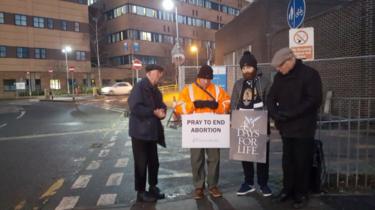
Anti-abortion activists have begun a 40-day "vigil" next to a Nottingham hospital - despite the trust asking them to stay away.
The Christian movement, called 40 Days for Life, insists its presence at the Queen's Medical Centre is "peaceful".
However, researchers into this type of activism have said it is a form of street harassment that is "incredibly intimidating and distressing".
The hospital said the activists had previously caused "distress".
'Not a protest'
John Edwards, from Nottingham 40 Days for Life, said the group was "always peaceful".
"40 Days for Life is a vigil of prayer, not a protest. We pray - for the unborn, and for their mothers, who are also harmed by abortion," he said.
"If anyone approaches us, we will talk to them, and can direct women to sources of support to help them keep their baby if that is what they wish. Many women around the country have been helped by such vigils."
The movement claims to help women by showing them an alternative to abortion, and claims many women have been grateful for their presence outside clinics.
The BBC asked to speak to some of these women but 40 Days for Life has not provided any contact details.
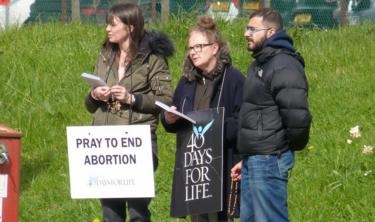
The action has been timed to coincide with Lent and it is the third year in a row that it has taken place in Nottingham.
They intend to be there from 06:00 GMT to 18:00 every day, with different activists signing up for "vigil hours".
In previous years they gathered outside the Circle Nottingham NHS Treatment Centre, where abortions and other medical procedures are carried out. However, this year they are by the hospital entrance on Leen Gate, which is just off NHS land.
It is thought to be Nottingham City Council land, and the council is investigating what action it can take.
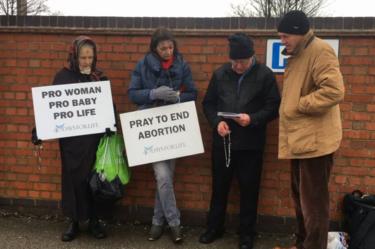
Councillor Nick McDonald, portfolio holder for adults and health, said: "We understand that despite a clear warning from both NUH [Nottingham University Hospitals] and from the council that this protest is not wanted in Nottingham, its organisers have pushed ahead with it.
"We will repeat, we fully support the trust's stance on this issue, and for our part we will not put up with Nottingham residents, whether staff or patients, being intimidated or harassed as has happened in previous years."
Councillor Toby Neal, portfolio holder for community and customer services, said: "We are aware that the protest has started, and we are investigating what action we can take to ensure the protection of the public. We will not shy away from taking any action we deem necessary to do that."
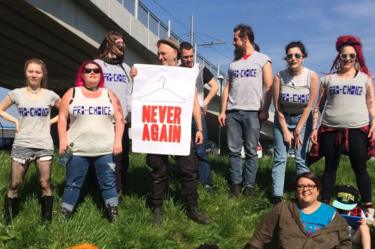
In November, Home Secretary Amber Rudd ordered an assessment of protests outside abortion clinics following concerns about the tactics of some "aggressive" protesters.
Dr Pam Lowe from Aston University has been researching anti-abortion activism in public spaces for nearly three years.
"All the evidence suggests that women do find this incredibly intimidating and distressing and we think it constitutes a form of street harassment," she said.
"It's all very well for them to say 'we're peaceful', and that might be the case, but women approaching don't know that, they don't know who these people are.
"You have to understand that women generally are nervous about public places, or can be nervous if they see a group of strangers."
Dr Lowe said the Nottingham demonstration is unusual because it is at a hospital, while most demonstrations take place outside abortion clinics.
What is the hospital doing?
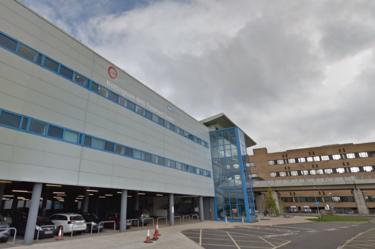 GOOGLE
GOOGLE
Before the demonstration began, Tracy Taylor, chief executive of Nottingham University Hospitals NHS Trust, said: "Previous protests by this group have caused very considerable distress to patients, visitors and staff, which we are not prepared to allow to happen again.
"As such, we do not give permission for any such protest to take place on our site."
However, the activists are thought to be just off NHS land, so it is not clear what the hospital can do.
The trust has said it does not support "any protest, on any matter" that "impacts adversely on our patients, visitors and staff".
It has not specified what action it will take, but in a statement said: "We are working closely with partner agencies to protect our patients and staff and have proactively explored a range of options should action be necessary from Wednesday so that we can ensure that all who need to access our services can do so and without intimidation or unnecessary distress."
How are women having abortions affected by activism?
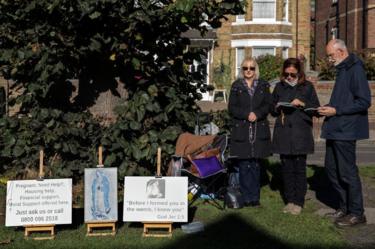 GETTY IMAGES
GETTY IMAGES
Dr Lowe has analysed comments made by women who have encountered anti-abortion activists on their way into clinics.
"It is intimidating, if all you know as a woman approaching the clinic seeking an abortion is there is a group of people on the pavement who want to stop you and you don't know what they're going to be doing," she said.
"Also they feel it's an invasion of healthcare privacy, so it draws attention to the space and it's a shaming position. It's drawing public attention to what's happening.
"This is a very private decision, it's a healthcare decision, and we wouldn't normally expect our private decisions to be made public in the way that it is."
She said counter demonstrations can potentially have a negative effect on women too, although some are timed so they are run at times when the clinics are not seeing women.
"The more there is a public spectacle outside the clinic the more difficult it can be for women. So it would be better for everybody involved if no-one was right outside the clinic," she said.
What have counter activists done?
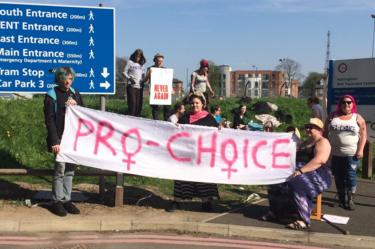
Rachel Strong, an activist with Pro-Choice Nottingham, took part in counter demonstrations in 2017 and campaigned to stop 40 Days for Life from going on the hospital site again.
"A small group of us were quite horrified by what they were doing because we are aware that it's really intimidating for anybody accessing reproductive healthcare to have to walk past these kind of vigils, these kind of demonstrations," she said.
The group had planned further counter demonstrations if 40 Days for Life returned to the entrance to Circle Nottingham, where women have abortions. However, the demonstrations have been cancelled for now as 40 Days for Life are in a different location.
"As this area is away from the treatment centre entrance and there is no sight of it from there we will not be holding a counter demo unless the situation changes," said Ms Strong.
No comments:
Post a Comment